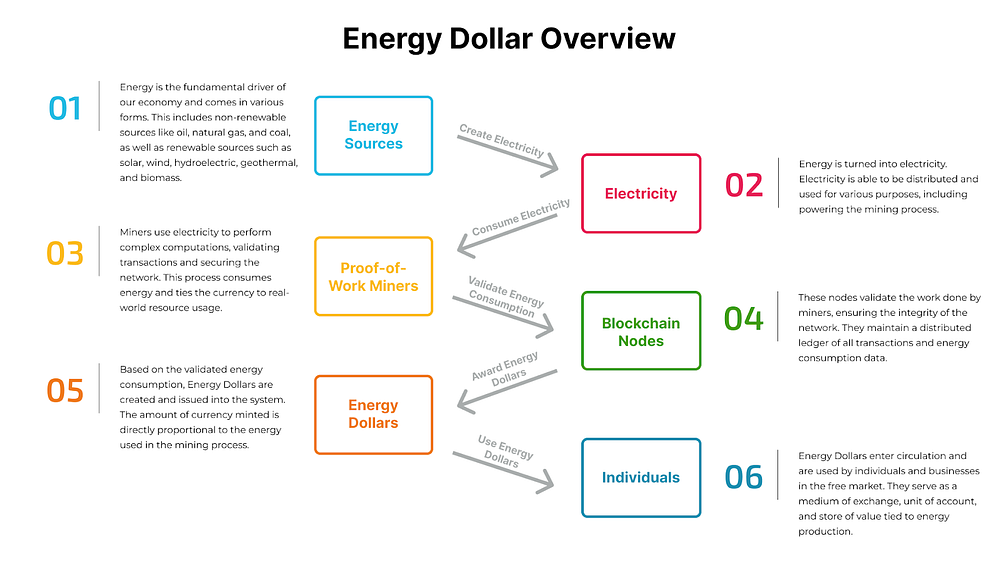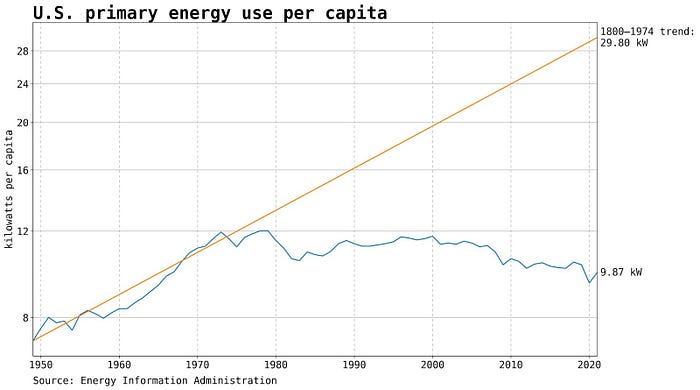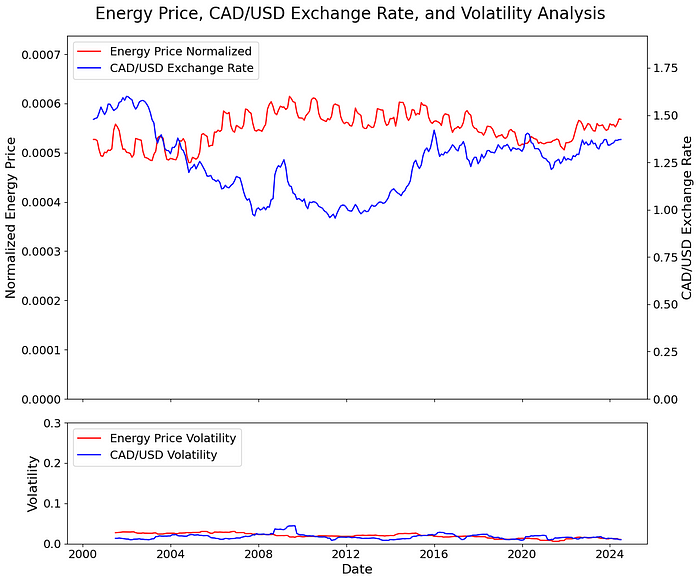and the distribution of digital products.
An Argument for an Energy Dollar
The story of humanity, its historical progress, struggling for a better life, technological advancement, and the pursuit of prosperity is a story about its command of energy. From the discovery of fire to the harnessing of nuclear power, the cultivation of flora and fauna to factory farming and meat processing, and arithmetic calculations using paper and abacus to electrons moving across complex circuits, as humanity achieves greater control over energy we progress civilization in leaps and bounds. On the precipice of a new, completely digital civilization it is time to reassess our dated economic systems born out of double entry bookkeeping in commodities and trading over the once risky high seas. Below I’ll form an argument for a currency linked to energy production which may seem radical, but is actually quite intuitive.
\ A rethinking of our monetary system is an urgent necessity today more than ever. With record inflation we face a financial crisis that will dwarf previous downturns. The treasury market has ballooned to over $27 trillion, up 60% since the global pandemic and 600% since the 2008 financial crisis. United States Federal debt is growing by $1 trillion quarterly, with government spending reaching World War II levels. This debt, borrowed at 5%, is keeping a global economy dependent on the US Dollar moving steadily towards a cliff few are warning us about. Financial institutions are treating treasuries as cash equivalents which allows for any instability to trigger a domino effect to the global financial system. This domino effect would force governments to take extreme interventions with unpredictable consequences and mass suffering as a guaranteed outcome.
\ With this context we’ll explore the concept of an Energy Dollar as an intuitive solution. By directly tying our monetary system to energy production, we could usher in a more stable, socially acceptable, and growth-oriented global economy.
\ An Energy Dollar could very well achieve material improvements upon the current global economy by:
\
Providing a more stable unit of account that is immune to monetary policy which has historically created negative interest rates and inflated asset bubbles.
Create a more accurate measure of economic activity, value creation, and real time feedback.
Offer a natural check against poor monetary policy by tieing currency directly to real energy expenditure.
Enhance human knowledge of markets and economies by providing more accurate prices and leading us to more efficient resource allocation.
\
Our current global economy is rapidly becoming more and more fragile. Rethinking the very nature of our money is necessary to mitigate the impacts of a pending global meltdown and continue our pursuit of a better life. The world has never been more ready and capable for a change of this nature and the need is dire.
The Energy DollarA revolutionary approach to currency, the Energy Dollar directly ties monetary value to energy production. Unlike the current fiat system, Energy Dollars would fluctuate based on global average energy prices across a diverse array of sources ensuring a true representation of the current energy market globally.
\ When compared to gold-backed currencies, the Energy Dollar is far more flexible, portable, and accurate in terms of economic productivity. Unlike fiat, the Energy Dollar is backed by tangible production of energy, resistant to inflation, available globally, and transparent in circulation.
\ We could easily achieve the vision of the Energy Dollar leveraging innovations in blockchain technologies that accurately measure energy consumption, provide the transparency needed, and already provide a global decentralized mechanism for consensus.
\
\ In the infographic above we demonstrate how blockchain technology provides a decentralized verification mechanism for energy production, managing currency issuance through a global network of computers expending energy. This ensures transparency through public auditing and a global consensus mechanism. Leveraging Proof-of-Work, anyone would be able to contribute resources in order to secure the network and participate in the economics of the Energy Dollar.
\ By leveraging blockchain technology and Proof-of-Work consensus mechanisms we can provide a currency that's more stable, transparent, and aligned with humanity’s progress and economic activity when compared to current options. By linking a currency to a more common reference point (energy) for all goods and services, the Energy Dollar would more accurately and efficiently align economic incentives with the thermodynamics of human production.
\ Relying on supply and demand dynamics, an energy currency demonstrates fundamental benefits of capitalism while mitigating risks. Combining the benefits of capitalism in aligning long-term rates of increasing prosperity and natural selection with fundamental laws of thermodynamics releases humanity from the dependency of central authorities which are prone to corruption and power dynamics that limit our ability to efficiently organize.
The Nature of Energy as a CurrencyThe ability of mankind to harness energy is the catalyst and greatest enabler of economic growth and prosperity. Historically, our currencies have approximated energy through commodities such as gold or grain until economic growth was stifled and central authorities opted to adopt a fiat system.
\ Commodity currencies, such as gold, have been an effective form of money primarily due to its production requiring significant energy inputs. This tied commodity currencies to its value in real-world resources. The scarcity of these commodities helps to maintain their value. However, as an economy grows and innovates, these currencies come with drawbacks. Many commodities have industrial or decorative uses that create secondary markets which in-turn distort their value. Additionally, other commodities can degrade in utility over time (such as grain). An ideal currency would represent energy inputs but lack use or value in secondary markets. Gold has been the best example in recent history due to its minimal use in industrial applications.
\ Fiat currencies, however, distort the ability for money to accurately reflect real economic value since it can be printed freely at will of a central authority. Ever since the United States moved off the gold standard in 1972, energy has only increased in price and the market's access to energy has completely flatlined.
\
\
\ Alternatively we can look at energy compared to the Canadian dollar, which is historically stable when traded with the US Dollar. In this example, energy has a lower volatility. The stable prices of energy demonstrate how an Energy Dollar offers a more consistent reference point than a single fiat currency.
\
\ When comparing energy to the Canadian dollar we begin to see a fundamental issue in our current monetary system. Central banks often struggle to implement efficient monetary policy as their human-driven decisions are often influenced by political pressures, short-term profit incentives, or misinterpretations of complex economic data. This has historically always led to suboptimal outcomes. The Energy Dollar in contrast, leverages physics which offers a more robust framework for gaining information to determine the size and behavior of monetary supply and economic activity. Where human decision makers are likely to act on their own interests, often undermining the people whom they’re meant to serve, the laws of thermodynamics are universal. Today we have the opportunity to use universal, impartial properties of our universe to unlock economic value at a global scale with equitable access.
Challenges and CriticismsThe idea of an energy based currency is not a new one. This intuitive idea was famously put forward by Henry Ford in the 1920’s and there were some notable criticisms of it despite its fundamental role in our global economy. Dispatchable energy, or energy available on-demand, is geographically constrained and temporarily stored. This makes energy highly localized and challenging to store efficiently over a long period of time. Additionally, some have said that energy doesn’t constitute a large enough portion of the economy to serve as a viable currency.
\ Good money should be storable, transportable, durable, divisible, and fungible. This is a criteria that energy itself fails to meet. However, a well designed Energy Dollar would embody these characteristics while reflecting the value of energy. This would capture the benefit of energy as an economic driver without the practical limitations of using energy directly as a medium of exchange. In fact, when leveraging a blockchain with a Proof-of-Work consensus mechanism, the energy inputs would be consumed at the point of minting the currency itself.
\ The inflation rate of the proposed Energy Dollar, like the current fiat system, would target a low, stable inflation rate (typically 2% annually). However, unlike the fiat system, the Energy Dollar’s inflation rate would be determined by advancements in energy production efficiencies rather than arbitration by a central bank. This is a much more natural, technology driven inflation serving a similar economic function that encourages circulation of money and discourages excessive hoarding.
\ At this point it's important to note that much like fiat, the Energy Dollar wouldn’t need to serve all functions of money equally. While it excels as a medium of exchange and stable unit of account, tying itself closely to real economic activities and human innovation, other assets would naturally emerge as better stores of value. Just as individuals often use real estate, company stocks, bonds, or gold as inflation hedges and long-term stores of value, these assets and others would co-exist with the Energy Dollar. The division of monetary functions have been beneficial to humanity in the past and are likely to continue while the Energy Dollar optimizes for facilitating transactions and reflecting technological progress. Other assets will likely handle long-term savings long into the future. This will be especially true when energy supplies are impacted by natural disasters or human failure during production while not impacting the ability for an Energy Dollar to be utilized as a medium of exchange.
Energizing the FutureThe Energy Dollar is much more than a novel economic concept, it’s a paradigm shift in how we think about our global economy and value human progress. When we link our monetary policy to humanity's ability to command energy we create a currency that promotes technological advancement and long-term growth. While facing unprecedented global challenges the Energy Dollar offers a compelling opportunity to forge a better future. Aligning our economic incentives with the fundamental drivers of human prosperity we will usher in an era of unprecedented innovation and growth.
\ The Energy Dollar is not just a currency, it’s a commitment to peace, a beacon guiding us towards a more rational, sustainable, and prosperous age for all of humanity.
- Home
- About Us
- Write For Us / Submit Content
- Advertising And Affiliates
- Feeds And Syndication
- Contact Us
- Login
- Privacy
All Rights Reserved. Copyright , Central Coast Communications, Inc.


